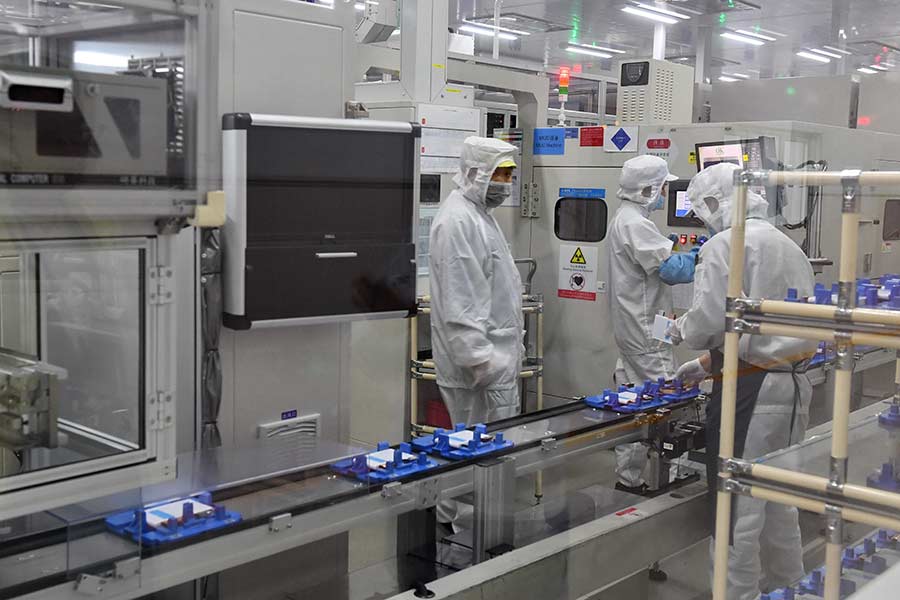Policies set to mitigate impact of outbreak
By LI XIANG | CHINA DAILY | Updated: 2020-04-13 08:44

China's economic growth is likely to contract sharply in the first quarter and the policy focus in the coming months should be on containing the risk of rising unemployment and preventing temporary shocks caused by the novel coronavirus outbreak from becoming permanent damage, economists said.
They also expect supportive government policies to facilitate a strong economic rebound in the second quarter and policymakers to continue using expansionary monetary and fiscal policies to offset the outbreak's negative impact on economic activities.
Attention has been focused on China's first-quarter economic performance as the country is scheduled to release first-quarter GDP growth and other key economic data later this week.
Most economists see China's first-quarter GDP growth as falling into negative territory and the official data will likely reflect a severe economic downturn in the first three months as the COVID-19 outbreak almost brought the country's economic activity to a standstill.
But observers said that the economy has shown signs of a gradual recovery as more restaurants and shopping malls reopened and more workers have returned to factories as production resumed. The lifting of the lockdown in Wuhan, Hubei province, the most affected region in China, has also sent a positive signal that stringent control measures have been effective in containing the virus.
Despite the disease control progress, the Chinese economy is facing increasing difficulties and the global spread of the virus has brought more uncertainties, according to a statement released after a top leadership meeting on Wednesday presided over by President Xi Jinping.
"I think one of the most pressing challenges facing the government is to prevent the epidemic from having a long-lasting impact on the economy. If there is widespread bankruptcy and large-scale layoffs, it will be very hard to return economic activity to normal," said Xu Gao, chief economist at BOC International.
China's unemployment rate in urban areas rose to 6.2 percent in February from 5.3 percent in the previous month, according to the National Bureau of Statistics.
"More active macroeconomic policies are needed to resolve the risks in the labor market and to help stimulate demand and create more jobs. We expect China's policy stance to remain accommodative and there is likely to be a substantial rebound of GDP growth in the second quarter," Xu said.
It is expected that the People's Bank of China, the nation's central bank, may further reduce the benchmark lending rates later this month as it is scheduled to announce its interest rate decision on April 20. The one-year lending rate currently stands at 4.05 percent.
Fiscal policies will continue to be proactive to facilitate the issuance of special treasury bonds and local government bonds to finance major infrastructure projects and to channel more affordable credit to smaller businesses and provide more subsidies to affected households, economists said.
They also warned about weakened external demand and disruption to the global supply chain as a result of the wider spread of the virus, which could in turn substantially reduce demand for Chinese products and thus slow the recovery of the Chinese economy.
Sebastian Eckardt, lead China economist at the World Bank, said that the global spread of the virus will negatively affect demand for Chinese exports, which makes it more important to stimulate domestic demand. He said that more fiscal stimulus is needed but it should be done in a balanced way that does not exacerbate existing debt problems.
While acknowledging the growing headwinds facing the economy, China's top leadership has stressed that the country will strive to minimize the negative impact of the outbreak and ensure that this year's goal of building a moderately prosperous society in all respects is achieved, which includes doubling the country's GDP and per capita income over the 2010 level.
The reiteration of achieving these goals has boosted market expectations of more accommodative policies to support economic growth.
Wang Tao, chief China economist at Swiss bank UBS, said that more policy easing will occur in the coming quarters including a higher fiscal deficit, the issuance of special treasury bonds, more government spending in the labor market and healthcare system, and stronger infrastructure investment.
Economists have been divided on whether it is necessary and reasonable for China to set a GDP growth target for this year. The government was scheduled to deliver its work report, including its economic agenda and targets, at the annual session of the National People's Congress, China's top legislature. However, this meeting has been postponed due to the outbreak.
Some economists argue that a growth target is crucial as it will help to stabilize business confidence and anchor market expectations while others believe that the government can abandon setting a growth target this year and policies should instead focus on ensuring stability in key areas such as employment.
























